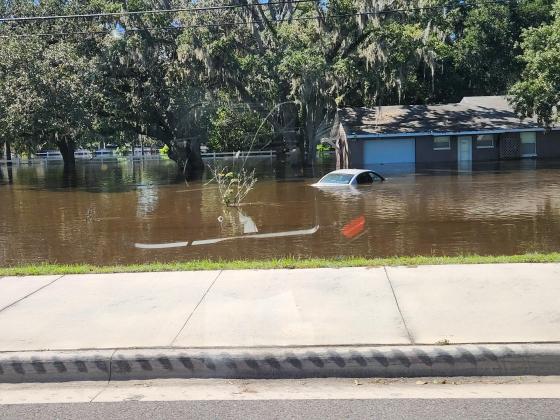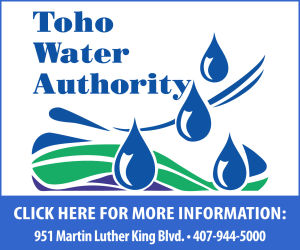Hurricane Ian has taken nearly all longtime Osceola County residents out of their comfort zone.
Standing flood water, after over 15 inches of rain over some parts of the county in just 32 hours, is in places we've never seen before. Lifelong resident and County Commission Chairman Brandon Arrington said it's, "unlike anything I've ever seen in my lifetime." That's especially true near the Shingle, Boggy and Reedy creeks.
Here are some safety precautions from the Florida Department of Health in Osceola County (FDOH-Osceola) to avoid and prevent health risks.
Food safety: Preventing Food-Borne Diseases
- Do not eat any food that may have come been in contact with contaminated water from flooding.
- Commercially prepared cans of food should not be eaten if there is bulging or an opening on the can or the screw caps, soda pop bottle tops or twist-caps.
- Assume that home-canned food is unsafe.
- Infants should be fed only pre-mixed, canned baby formula. Do not use powdered formulas prepared with treated water. Use boiled water when preparing formula.
- Frozen and refrigerated foods can be unsafe after a hurricane. Thawed and refrigerated foods should be thrown out. "When in doubt, throw it out."
Sanitation and Hygiene: Preventing Waterborne Illness
- Basic hygiene is very important. Always wash your hands using soap with water that has been boiled or disinfected before eating, after toilet use, after participating in cleanup activities, and after handling articles contaminated by floodwater or sewage.
- Avoid flood waters. Flooding that occurs after a hurricane may mean that water contains fecal matter from sewage systems, agricultural waste, industrial waste, and septic tanks.
- If you have open cuts or sores exposed to the floodwater, keep them as clean as possible by washing them with soap and disinfected or boiled water. Apply antibiotic ointment to reduce the risk of infection. If a wound or sore develops redness, swelling or drainage, see a physician immediately.
- Do you have bleach? Do not allow children to play with toys that have been in floodwater until the toys have been disinfected. Use ¼ cup of bleach in one gallon of water to disinfect toys and other items.
Preventing Fire Hazards
- Using battery-powered lanterns and flashlights is preferable to using candles.
- If you must use candles, make sure you keep them away from curtains, paper, wood, or other flammable items.
Drain and Cover: Preventing Mosquito-Borne Illness, and other insects
- The heavy rain and standing flood waters can lead to an increase in mosquitoes. FDOH-Osceola urges the public to remain diligent in their personal mosquito protection efforts. These should include the “5 D’s” for prevention:
- Dusk and Dawn – Avoid being outdoors when mosquitoes are most active. For many species, this is during the dusk and dawn hours.
- Dress – Wear clothing that covers most of your skin.
- DEET – When the potential exists for exposure to mosquitoes, repellents containing DEET (N,N-diethyl-meta-toluamide, or N,N-diethyl-3-methylbenzamide) are recommended. Picaridin and oil of lemon eucalyptus are other repellent options.
- Drain – Check around your home and drain standing water.
- Infants should be kept indoors or mosquito netting should be used over carriers when mosquitoes are present.
- Another reason to stay out of flood water is the presence of floating red ant piles.
En Espanol: Los peligros de una tormenta no terminan después de que pasa. Mientras los residentes continúan recuperándose del huracán Ian, el Departamento de Salud de Florida en el condado de Osceola (FDOH-Osceola) alerta a todos los residentes a seguir las precauciones de seguridad.
Seguridad de los Alimentos: Prevención de las Enfermedades Transmitidas por los Alimentos
- No coma ningún alimento que pueda haber estado en contacto con agua contaminada por las inundaciones.
- Las latas de comida preparadas comercialmente no se deben comer si hay una protuberancia o una abertura en la lata o en las tapas de rosca, las tapas de las botellas de refrescos o las tapas giratorias.
- Asuma que los alimentos enlatados en casa no son seguros.
- Los bebés deben ser alimentados únicamente con fórmula para bebés enlatada y premezclada. No use fórmulas en polvo preparadas con agua tratada. Use agua hervida cuando prepare la fórmula.
- Los alimentos congelados y refrigerados pueden ser peligrosos después de un huracán. Los alimentos descongelados deben desecharse.
Saneamiento e Higiene: Prevención de Enfermedades Transmitidas por el Agua
- La higiene básica es muy importante. Siempre lávese las manos con jabón y agua que haya sido hervida o desinfectada antes de comer, después de usar el baño, después de participar en actividades de limpieza y después de manipular artículos contaminados por aguas de inundación o aguas residuales.
- Evite las aguas de inundación. Las inundaciones que ocurren después de un huracán pueden significar que el agua contiene materia fecal de los sistemas de alcantarillado, desechos agrícolas, desechos industriales y fosas sépticas.
- Si tiene heridas abiertas o llagas expuestas al agua de la inundación, manténgalas lo más limpias posible lavándolas con jabón y agua desinfectada o hervida. Aplicar pomada antibiótica para reducir el riesgo de infección. Si una herida o llaga se enrojece, se hincha o supura, consulte a un médico de inmediato.
- No permita que los niños jueguen con juguetes que hayan estado en agua de inundación hasta que los juguetes hayan sido desinfectados. Use ¼ de taza de blanqueador desinfectante en un galón de agua para desinfectar juguetes y otros artículos.
Cortes de Energía: Prevención de Riesgos de Incendio
- Es preferible usar lámparas y linternas que funcionen con baterías que usar velas.
- Si debe usar velas, asegúrese de mantenerlas alejadas de cortinas, papel, madera u otros elementos inflamables.
Drenar y Cubrir: Prevención de Enfermedades Transmitidas por Mosquitos
- Las fuertes lluvias y las inundaciones pueden provocar un aumento de los mosquitos. FDOH-Osceola insta al público a permanecer diligente en sus esfuerzos personales de protección contra mosquitos. Estos deben incluir lo siguiente para la prevención:
- Amanecer y atardecer: evite estar al aire libre cuando los mosquitos están más activos. Para muchas especies, esto es durante las horas del anochecer y el amanecer.
- Vestir: use ropa que cubra la mayor parte de su piel.
- DEET: cuando existe la posibilidad de exposición a los mosquitos, se recomiendan repelentes que contengan DEET (N,N-diethyl-meta-toluamide, or N,N-diethyl-3-methylbenzamide). Use repelente o aceite de eucalipto limón son otras opciones.
- Drene: revise su casa y drene el agua estancada.
- Los bebés deben permanecer en el interior o se deben usar mosquiteros sobre los cargadores de bebe cuando hay mosquitos presentes.




